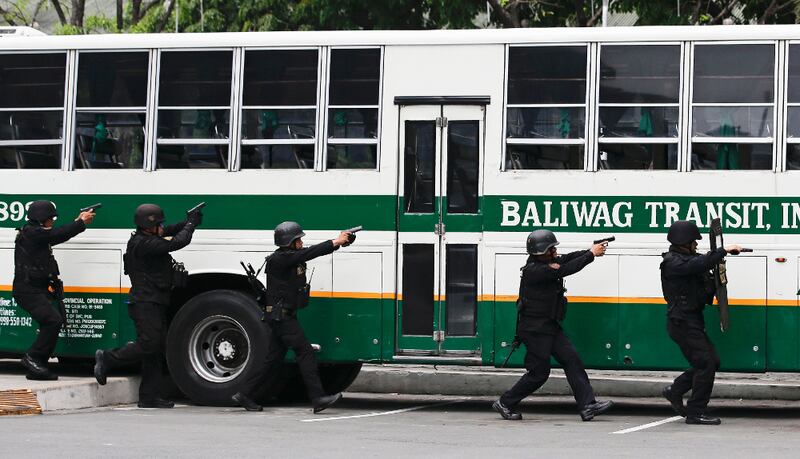Updated at 12:03 p.m. ET on 2020-06-26
Philippine security forces killed four suspected militants during a pre-dawn raid in Metro Manila on Friday, the first time in recent years that Muslim extremists were believed to have launched an operation in the capital region, the police and military said.
The four suspects who died during a gunbattle with government forces were linked to the Abu Sayyaf Group (ASG) or Daulah Islamiyah, the Philippine name for the terror group known as Islamic State (IS), said Col. Robin Sarmiento, the police commander in Parañaque City, a Manila suburb where the raid took place.
“Their presence in Parañaque City has something to do with the coordination and planning of terrorist activities,” he said.
A police officer, Corporal Ehrol Gamboa, was injured in the shootout during the operation launched by security forces shortly after midnight in Don Bosco, a village in Parañaque City.
The four suspects were killed as they engaged approaching troops and police in a firefight and attempted to throw a hand grenade, officials said.
Sarmiento said officers were on a mission to serve arrest warrants against the suspects, who were identified as Bensaudi Sali, 37; Merhama Abdul Sawari, 40; Rasmin Hussin; and Jamal Kamiling,
“Information further disclosed that the couple were engaged in an illegal firearms transaction,” Sarmiento said, referring to Bensaudi and Merhama.
Authorities at the scene recovered two black Islamic State flags, grenades, an assault rifle and bomb-making materials, officials said.
Friday’s violence in the Manila capital region proved that “terrorist groups know no pandemic” and would strike anytime, Philippine military chief Gen. Felimon Santos said in a statement.
“Not even COVID-19 could deter or prevent the terrorists ASG and their cohorts from planning and looking for the opportune time to strike and kill or maim innocent civilians and to destroy massively government infrastructure and property,” he said.
However, he did not explain how the Abu Sayyaf suspects managed to slip through authorities in the Manila area.
Military and police intelligence units said that the slain Abu Sayyaf suspects were the “financial conduits” for the Philippine branch of IS, and that their operations in the Manila area began sometime in November 2019.
They apparently had an “established connection” with a man named Mundi Sawadjaan, “one of the key planners of the twin bombing at the Jolo Cathedral in Sulu by an Indonesian couple on January 27, 2019,” officials with the police intelligence unit said.
A branch of the Abu Sayyaf led by Hatib Hajan Sawadjaan is the Philippine front for Islamic State. It has been engaged in a series of attacks and bombings since last year, including the January 2019 bomb attack that killed 23 people at a church on Jolo Island.
It still was not clear who the actual terror financier was, but the funds were believed to be coming from the Sulawesi region of Indonesia, the intelligence unit said. Poso, a regency in Central Sulawesi province, is a hotbed of militant activity linked to the Eastern Indonesia Mujahidin, a pro-IS group.

In the Philippines, Abu Sayyaf is the smallest of several armed groups operating in the southern region, but is the most brutal among them. ASG has carried out kidnappings, bombings and killings mostly in the south.
Sawadjaan took over as IS leader in the Philippines after Isnilon Hapilon was killed toward the end of a five-month battle with government forces in southern Marawi city in October 2017. Hapilon’s men had seized the city to convert it into an Islamic caliphate in the region.
While there have been consistent intelligence reports that the Abu Sayyaf or other militants may try to infiltrate suburban areas near the capital, government forces have always maintained that security remained tight to prevent attacks in and around Manila.
The violence came as President Rodrigo Duterte was poised to sign a law that would strengthen the country’s anti-terror measures. Human rights groups and members of the opposition have warned that his administration could use provisions in the proposed law to go after the president’s critics, although government officials have assured the public this would not be the case.
Gen. Santos said Friday’s development all the more served to highlight the need for Duterte to sign the anti-terrorism bill.
“It is public security and general welfare at stake,” he said. “We should protect and defend from terrorists – without further delay than it had already been – fellow Filipinos from wanted death and destruction of their property.”
![Students and activists stage an Independence Day protest in Manila against an anti-terrorism bill ratified by the Philippine legislature, June 12, 2020. [Luis Liwanag/BenarNews]](/resizer/v2/COMMHOUNKS47XX47C6LXXFOJKE.jpg?auth=2be01f37a728711b17499f1f3b276c5b208491fe524e14ab2ffafdc99eccf0ba&width=800&height=533)
Meanwhile, International Alert, a London-based NGO that advocates for conflict resolution, said the anti-terror law would only result in wrongful arrests and fuel more violence in Mindanao, the largest of the islands in the Philippine south.
“There is systemic discrimination against Muslims in the country. Wrongful arrests occur not because of a weak surveillance and intelligence capacity of our security forces, but because Muslims are deemed as more likely than the rest of the population to commit violent acts or join terrorist groups,” International Alert said about the anti-terror bill.
“Grievances of and injustices against Muslim minorities resulting from the Anti- Terrorism Law will only lead to violent reciprocal action and will further exacerbate existing violent conflict dynamics,” it warned.
Mark Navales contributed to this report from Cotabato, Philippines.This updated version adds new photos and corrects the dateline.
